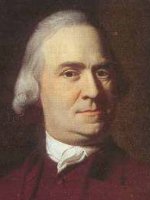No, No, We Meant that Other Sect Is Contemptible!
 People outside New England noticed the Boston Gazette’s criticism of “two or three weak and imbittered Persons, of the most insignificant and contemptible of all Sects,” for opening their shops on the Patriots’ Thanksgiving in December 1774. And some of those people didn’t realize, as the Rev. Dr. Ezra Stiles did, that the sect at issue was the Sandemanians rather than the Quakers.
People outside New England noticed the Boston Gazette’s criticism of “two or three weak and imbittered Persons, of the most insignificant and contemptible of all Sects,” for opening their shops on the Patriots’ Thanksgiving in December 1774. And some of those people didn’t realize, as the Rev. Dr. Ezra Stiles did, that the sect at issue was the Sandemanians rather than the Quakers.
Memories of Massachusetts’s seventeenth-century persecution of Quakers were still vivid enough to cause problems for the Massachusetts delegates to the Continental Congress. Furthermore, unlike the small and weak Sandemanians, Quakers had political power and wealth in the Middle Colonies. Therefore, the Patriots moved to correct the misunderstanding.
On 18 Feb 1775, the Pennsylvania Ledger in Philadelphia carried a “Letter from a Gentleman in Boston, to his Friend in this city, dated Feb. 1, 1775”:
The day appointed by the provincial congress for a public thanksgiving, a number of persons, in this town, showed their disapprobation thereto, by opening their shops as usual, for which they were treated in an uncivil manner, and those persons were said to be Quakers.I especially like how the writer dropped the Quaker “thee” into his prose.
I therefore think it my duty, as an honest, impartial, and most unbiassed member of this community, and one who wished nothing more ardently that that a true, fair, and candid representation of facts might appear, to assure thee, and I can of my own certain knowledge assure thee, that it is a most malicious and injurious falsehood, and no doubt, propagated by the base enemies of our invaluable constitutional rights and privileges, for the most vile and malevolent purposes—for I do well know, that the Friends in this town, did not open their shops on said Thanksgiving day; nor have I heard the least unfriendly or uncivil expression uttered by any of the inhabitants of this town against them, as a people, for many year; but, on the contrary, I do most certainly know, that they are always, and on all occasions, treated with full as much (and I think more) catholic tenderness, friendly and neighbourly kindess and affection, than persons of any other sect of denomination amongst us.
This letter acknowledged what the earlier report in the Boston Gazette had not: that “uncivil” criticism of the shopkeepers had come from locals as well as passing British soldiers. Furthermore, while describing Bostonians’ kindness toward the Quakers—who had political power in the Middle Colonies—the writer glossed over the community’s hostility toward the Sandemanians.
One day before the date of that letter, Samuel Adams wrote on the same topic to Stephen Collins, a Quaker merchant he had met in Philadelphia, with some more detail:
It is also a Misrepresentation that the sect taken notice of for opening their Shops on our late Thanksgiving Day, was that of the People called Quaquers. They were the Disciples of the late Mr. [Robert] Sanderman, who worship God here without the least Molestation according to their own manner, and are in no other Light disregarded here but as it is said they are in general avowed Friends of the Ministerial Measures.Adams was being disingenuous here, in several ways. First, he and his colleagues bitterly opposed Catholicism, as did most of the British Empire; the Massachusetts Thanksgiving proclamation even referred to the “Protestant Succession” as something to be thankful for.
This is what I am told, for my own part I know but little or nothing about them. The Different denominations of Christians here (excepting those amongst them who Espouse the cause of our Enemies) are in perfect peace and Harmony, as I trust they always will be.
Second, the Sandemanians’ religion and politics were intricately entwined. Their faith required them to be Loyalists, or at least loyal to whatever government was in power. And the newspaper’s criticism of them wasn’t limited to their support of “the Ministerial Measures”; it described the Sandemanians as “the most insignificant and contemptible of all Sects, (who make Pretensions to Christianity).”
Finally, some of those Sandemanians were vocal in Boston politics, so it’s hard to believe Adams when he wrote, “for my own part I know but little or nothing about them.” I’m sure he had opinions.

No comments:
Post a Comment